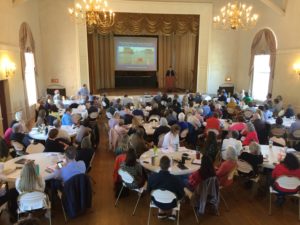 By George Humphrey, Scituate
By George Humphrey, Scituate
More frequent flooding along the South Shore’s coast and inland waterways; salt marshes deteriorating into mud flats; entire summers with daily temperatures above 90˚; winters with more rain than snow and increasingly intense rainfall events; severe challenges to town stormwater infrastructure and potable water supply; and a declining tax base due to the loss of low-lying residential property – these are among the more sobering outcomes discussed at the NSRWA co-sponsored South Shore Climate Change Symposium held on May 9 at Norwell’s Cushing Memorial Hall. Over 100 state and local leaders and concerned citizens attended the day-long event, which included speakers from the Woods Hole Oceanographic Institution, NSRWA, MassBays, National Grid, the Metropolitan Area Planning Council (MAPC), and the Massachusetts Office of Coastal Zone Management, as well as communities throughout the South Shore.
Sara Grady – NSRWA’s Watershed Ecologist and MassBays Regional Coordinator – spoke of her work monitoring the health of the South Shore’s estuaries, where salt and fresh waters meet to form our distinctive salt marshes. As marshes contract due to increasingly higher tides, they provide fewer ecosystem services, and as water temperatures rise, fish arrive earlier to spawn in ponds that may not have adequate food supply. Additional stress comes from the land in the form of wastewater and fertilizer runoff, which damage marshes with increased nutrients.
While the impact of climate change on rising sea levels has received wide media attention, its effect on freshwater supply rarely makes headlines in New England. With the likelihood of more summer droughts and hotter summers increasing, towns and individuals will likely use more water for lawn watering and themselves. This will exacerbate South Shore town water supplies that are already finding it difficult to meet current summertime demands and increase groundwater depletion which is reducing some of our rivers and streams flows and impacting their ability to sustain fish migration and the watershed’s ecosystem.
“It’s the crisis of our lifetime,” said NSRWA Executive Director Samantha Woods. And to deal with these trends, “we all need to change our relationship to water and how we treat it – as a precious and reusable resource, not something to be used and thrown away.”
What practical steps can local towns and individual residents take to address some of these issues? Here are some important takeaways from the Symposium:
- Conserving water is probably the most important single action an individual can take in response to the effects of global warming; in Scituate a 1 day per week restriction on lawn watering conserved over 300,000 gallons of groundwater per day!
- Towns need to adopt adaptive water management techniques to manage for these new seasonal extremes, not just yearly averages;
- Towns should also consider adopting stricter stormwater and landscaping bylaws that limit lawn areas and reduce impermeable surfaces such as parking lots;
- South Shore residents who wish to support statewide efforts to address climate change may be interested in House Bill H.832, known as the “2050 Roadmap,” sponsored by Representative Joan Meschino (Cohasset, Hingham, Hull, Scituate).
Click here to see Sara Grady’s presntation – Coastal Ecological Impacts of Climate Change
Click here to see Samantha Woods’ presentation – Preparing for the Next Drought
For more information on NSWRA’s initiatives in these areas, please visit our website at www.nsrwa.org.
